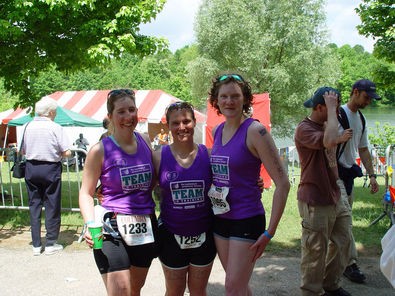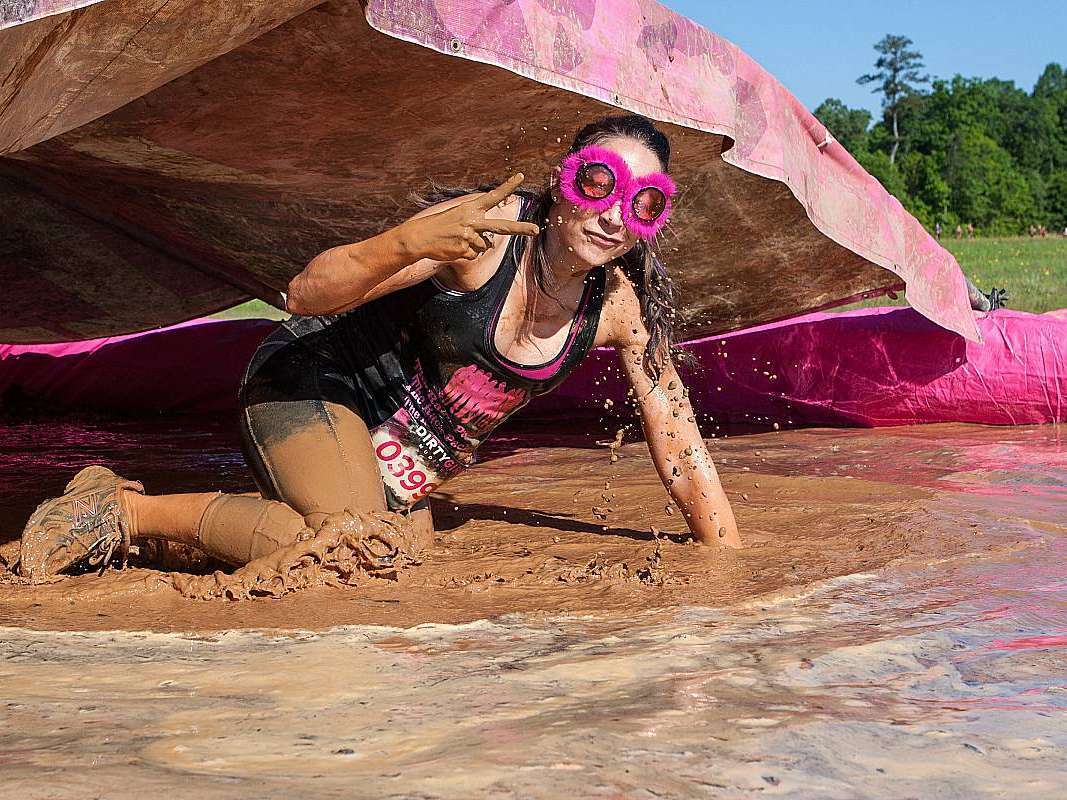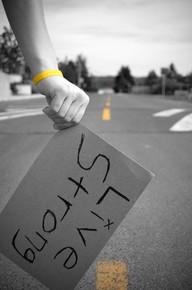 This is the second post in a 3-part series: 3 Things Every Triathlete Should Learn From Lance Armstrong.
This is the second post in a 3-part series: 3 Things Every Triathlete Should Learn From Lance Armstrong.
Today, I’ll be focusing on “Lance the Survivor.” I chose the description based on Armstrong’s answer to a question about how he “beat cancer.” Lance responded, “First of all, I didn’t “beat” cancer, I survived it.”
October 8, 1996, Lance Armstrong held a press conference, and gave a statement that rocked the international cycling community and entire sports world:
I would like to thank everyone for coming to hear what I have to say today. I have some news regarding my health to share with you. On Wednesday, October 2nd, I was diagnosed with testicular cancer. The CT-Scan revealed that my condition has spread into my lungs and abdomen. In terms of degrees of the disease, my condition is considered to be advanced and, thus, yesterday I began my first day of chemotherapy treatment. For now, I must focus on my treatment. However, I want you all to know that I intend to beat this disease, and further, I intend to ride again as a professional cyclist.
~ Lance Armstrong
Armstrong Survived Cancer
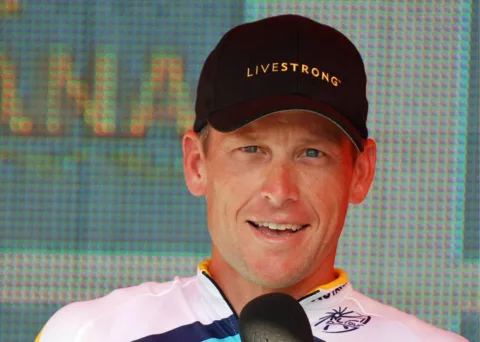
Lance Armstrong was a world-class elite athlete in perfect health with no history of significant health problems when he discovered he was in the advanced stages of cancer.
He went from invincible to being given a 10% chance of survival.
Consider this:
- There are more than 10.5 million cancer survivors living in the United States today. This number has more than tripled in the past 30 years.
- 1.4 million Americans are expected to be diagnosed with cancer this year.
- 560,000 Americans are expected to die from cancer this year, or more than 1,500 per day.
- Nearly 1 in 2 men and 1 in 3 women will develop cancer during their lifetime.
- Included in all the above statistics are healthy, invincible, iron-willed athletes just like you.
Lance never figured he would be diagnosed with cancer. I’m guessing you figure you never will be either.
You are a triathlete but first you are a human, and 1,500 humans like you in America die from cancer every single day. There are 10.5 million cancer survivors in America, some of them are triathletes.
It could happen to you.
This post is about waking you up and opening your eyes to cancer, the leading cause of death in America among adults under the age of 85.
As you know, Lance Armstrong created a cancer foundation, Livestrong and has dedicated his life to the fight against cancer.
How You Live Today Impacts Your Future
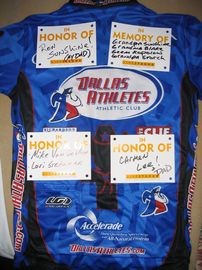 Cancer is a term used for diseases in which abnormal cells grow out of control and are able to invade other tissues.
Cancer is a term used for diseases in which abnormal cells grow out of control and are able to invade other tissues.
This abnormal cell growth can result in the formation of malignant (cancerous) lumps, masses, or tumors in the body. Cancer can spread from where it started to different areas of the body. This process is called metastasis. Research suggests that only five percent of cancers are hereditary.
That means the non-genetic causes of cancer — the lifestyle choices we make, the foods we eat, and our physical activity levels — have a direct impact on our overall cancer risk.
Preventable Cancers
There are types of cancer that are identified as “preventable.”
What follows is a list of preventable cancers with a link to a page that discusses risk reduction and early detection:
-
Testicular cancer, which is the cancer that Lance Armstrong survived
In general, living a low-risk lifestyle for reducing your cancer risk involves:
- Improving your diet
- Increasing your physical activity
- Quitting smoking
- Getting recommended screenings
The good news for you as a triathlete is that it’s highly likely you have the first 3 items already covered. Your triathlon training nutrition plan, level of physical fitness, and not smoking automatically place you at lower risk for cancer. And yet, these things were also true of Lance Armstrong, which brings to mind 2 important matters left to discuss about you and cancer.
Regular Screening Is Important
The one thing most people don’t do is get screened. We don’t because it’s inconvenient. I understand. But consider this: many cancers are over 90% curable when found early. Lance Armstrong was in the late stages of his cancer before it was detected. He admits to ignoring the signs of health problems for too long.
Annual screening tests like the Pap test and mammogram if you are a woman, and a DRE (digital rectal exam) and PSA (Prostate-Specific Antigen) if you are a man are critical. Both the Pap test and PSA can detect cellular changes before they become cancerous, and the mammogram can detect breast cancer in its earliest stages.
50 is the magic age for screening for colon cancer. I recently did a post about New Year’s Resolutions for triathletes. Consider adding this one to your list: scheduling your 2009 screening!
Triathletes And Cancer
The triathlon community is filled with men and women who, like Lance, survived cancer and remain active and competitive in the sport… like Karen.
The triathlon community is also heavily involved in promoting cancer awareness. For example, the Danskin Women’s Triathlon Series is a major force in breast cancer research.
Here are some things you can do as a triathlete to be part of the battle against cancer:
- Educate yourself. It’s likely that you personally know someone (or of someone) who has died of cancer. Think of all the books you will read in your lifetime. What about reading one book about cancer in their honor.
Here are a few suggestions: It’s Not About the Bike, Only When I Sleep: My Family’s Journey Through Cancer, and The Cancer Prevention Book.
Be the example. Eat right, stay in the sport of triathlon, don’t smoke, get screened, and encourage family and friends to do the same.
- Support cancer awareness and research. Be creative. Rather than just writing a check, consider leveraging your triathlon involvement to raise awareness and resources in the battle against cancer.
- Do a triathlon with Danskin or Team in Training. Over the past 20 years, the Leukemia & Lymphoma Society has been the world’s largest voluntary health organization dedicated to funding blood cancer research and providing education and patient services. Their Team In Training program has grown to become an unparalleled sports training program. Lymphomas account for about 5% of all cases of cancer in the U.S.. There is a Team In Training program for triathletes.
Music Speak Volumes
Music group, Wideawake, has a song entitled Maybe Tonight Maybe Tomorrow, which was written for Lance Armstrong’s cancer foundation, Livestrong.
Check out the video:
Here are the lyrics:
I heard the news today.
It came out of nowhere.
I wish I could run away,
but where would I go?
Is this my destiny?
Something so unfair…
What will become of me?
God only knows.
And they say the road to heaven might lead us back through hell.
Maybe tonight, maybe tomorrow,
we will win this fight and bury this sorrow.
We’re so alive, still holding on, not ready to die,
so we LIVESTRONG.
My pride is left for dead,
as my world gets shaken.
The thoughts inside my head
are so hard to control.
I am staring down the unknown,
but one thing is certain.
You could break my body,
but you will never break my soul.
And they say the road to heaven might leads us back through hell,
but we’re holding on for more than stories to tell.
Maybe tonight, maybe tomorrow,
we will win this fight and bury this sorrow.
We’re so alive, still holding on, not ready to die,
so we LIVESTRONG
Never Stop
I got to know a young girl (Lucy) through my own Team in Training experience years ago. Deep inside I carry the memory of that moment when her mom called to tell me she had died. I wept. This post is in her honor.

